 Some people experience more in one day than most people do in a lifetime. Occultist, ceremonial magician, poet, novelist, mountaineer, and painter Aleister Crowley could be placed in this unusual category. For those of you that haven't got the time to read one of the many biographies of him, try the long and extensive Wikipedia article. You will get the general idea. Aleister Crowley was born to wealthy family and had all the opportunities that money could buy. However, he avoided the beaten path and chose a life of eccentrism. Crowley had a motto: "Do What Thou Wilt". And he lived by it. Crowley wrote poems, founded a religion (Thelema), joined several orders, climbed mountains, spied (allegedly) for the intelligence service, had sex with both men and women, practised sex magic, got addicted to drugs, travelled and lived abroad, fought legal disputes, faked his own death and more. No rest for the wicked. He called himself the Beast 666. Crowley considered himself to be one of the outstanding figures of his time. Not everybody agreed. Some people despised him for his decadent lifestyle. He was characterized in a libel case: "I have been over forty years engaged in the administration of the law in one capacity or another. I thought that I knew of every conceivable form of wickedness. I thought that everything which was vicious and bad had been produced at one time or another before me. I have learnt in this case that we can always learn something more if we live long enough. I have never heard such dreadful, horrible, blasphemous and abominable stuff as that which has been produced by the man (Crowley) who describes himself to you as the greatest living poet." Aleister Crowley died in poverty and obscurity in an English rooming house in 1947. After his death he became a figure in popular culture. The Beatles put his picture on the Sgt. Pepper’s Lonely Hearts Club Band album cover in 1967 (back row, second from left). Led Zeppelin guitarist Jimmy Page purchased Boleskine House in 1970, a manor (the portal to Hell) previously owned by Crowley near Loch Ness in Scotland. Ozzy Osbourne recorded Mr. Crowley (what went on in your head?) in 1980. No matter what you think of him, I think we all can agree that Aleister Crowley lived a life less ordinary.
Some people experience more in one day than most people do in a lifetime. Occultist, ceremonial magician, poet, novelist, mountaineer, and painter Aleister Crowley could be placed in this unusual category. For those of you that haven't got the time to read one of the many biographies of him, try the long and extensive Wikipedia article. You will get the general idea. Aleister Crowley was born to wealthy family and had all the opportunities that money could buy. However, he avoided the beaten path and chose a life of eccentrism. Crowley had a motto: "Do What Thou Wilt". And he lived by it. Crowley wrote poems, founded a religion (Thelema), joined several orders, climbed mountains, spied (allegedly) for the intelligence service, had sex with both men and women, practised sex magic, got addicted to drugs, travelled and lived abroad, fought legal disputes, faked his own death and more. No rest for the wicked. He called himself the Beast 666. Crowley considered himself to be one of the outstanding figures of his time. Not everybody agreed. Some people despised him for his decadent lifestyle. He was characterized in a libel case: "I have been over forty years engaged in the administration of the law in one capacity or another. I thought that I knew of every conceivable form of wickedness. I thought that everything which was vicious and bad had been produced at one time or another before me. I have learnt in this case that we can always learn something more if we live long enough. I have never heard such dreadful, horrible, blasphemous and abominable stuff as that which has been produced by the man (Crowley) who describes himself to you as the greatest living poet." Aleister Crowley died in poverty and obscurity in an English rooming house in 1947. After his death he became a figure in popular culture. The Beatles put his picture on the Sgt. Pepper’s Lonely Hearts Club Band album cover in 1967 (back row, second from left). Led Zeppelin guitarist Jimmy Page purchased Boleskine House in 1970, a manor (the portal to Hell) previously owned by Crowley near Loch Ness in Scotland. Ozzy Osbourne recorded Mr. Crowley (what went on in your head?) in 1980. No matter what you think of him, I think we all can agree that Aleister Crowley lived a life less ordinary.
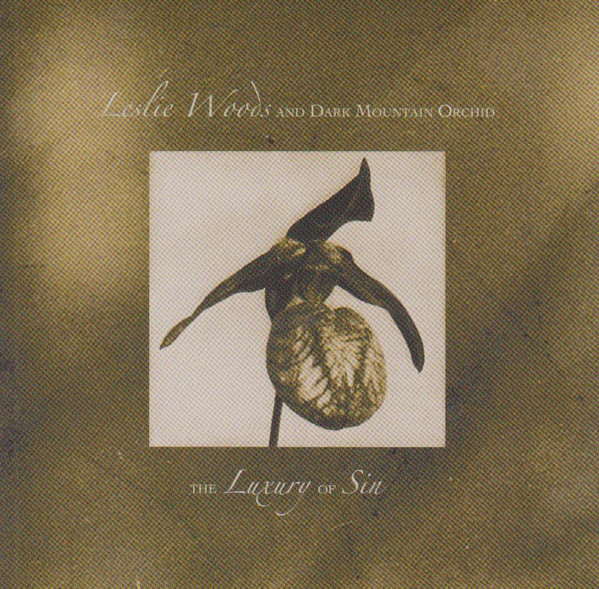 This is the fifth of six blog posts in a series of female artists or female-fronted bands that will be published under 2024. This fifth blog post deals with singer-songwriter Leslie Woods and her band Dark Mountain Orchid. The style can be labeled "Appalachian Gothic". The album "The Luxury of Sin" was released in 2004 and is a collection of twelve original songs. The 2-cd European release on Glitterhouse Records contains the debut album "Velvet Sky" as a free bonus disc. Leslie Woods is from Knoxville, Tennessee. She looked and dressed like a goth girl (at least in 2004). Goth is a good thing. An album review caught my attention: "Unease and longing conjured from the places where old growth trees cast perpetual gloom on a land soaked in blood." What's not to like about this vivid description? The album "The Luxury of Sin" is disturbing yet compelling. According to reputable No Depression Magazine it can be described as "dark, erotic, dreamy-style". I totally agree. The best songs are "Train", "Say Anything", "I Was Younger Then", "Cami", "Heart Is Black", "What I Thought", "Heroin". The arrangements are solid. This is so much better than all the copiers, fakers, imitators, impersonaters and imposters out there. The album isn't particularly rare. You can find an used copy here and there.
This is the fifth of six blog posts in a series of female artists or female-fronted bands that will be published under 2024. This fifth blog post deals with singer-songwriter Leslie Woods and her band Dark Mountain Orchid. The style can be labeled "Appalachian Gothic". The album "The Luxury of Sin" was released in 2004 and is a collection of twelve original songs. The 2-cd European release on Glitterhouse Records contains the debut album "Velvet Sky" as a free bonus disc. Leslie Woods is from Knoxville, Tennessee. She looked and dressed like a goth girl (at least in 2004). Goth is a good thing. An album review caught my attention: "Unease and longing conjured from the places where old growth trees cast perpetual gloom on a land soaked in blood." What's not to like about this vivid description? The album "The Luxury of Sin" is disturbing yet compelling. According to reputable No Depression Magazine it can be described as "dark, erotic, dreamy-style". I totally agree. The best songs are "Train", "Say Anything", "I Was Younger Then", "Cami", "Heart Is Black", "What I Thought", "Heroin". The arrangements are solid. This is so much better than all the copiers, fakers, imitators, impersonaters and imposters out there. The album isn't particularly rare. You can find an used copy here and there.
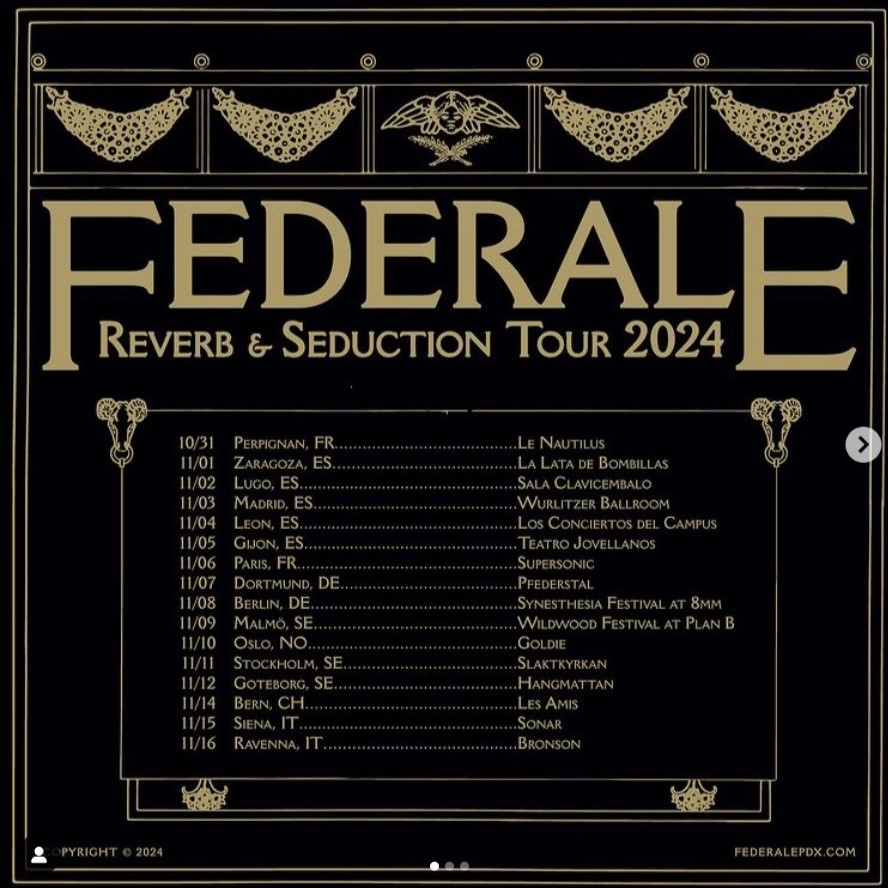 When you live in a remote country in northern Europe, gothic country bands are not exactly queuing up in front of you. Be there or be square. Federale from Portland, OR are on their first European tour including Spain, France, Germany, Denmark, Sweden, Norway, Switzerland and Italy. For some reason, countries like Belgium, Netherlands and the UK are not included. Nor did they tour in Central Europe (Poland, Czechia and Hungary). The latter countries are really into this kind of music. Federale can be labeled as "gothic western", "spagetti western", "Cinematic Western Folk Music" and last but not least "spagetti northwestern" (very witty). The setting was perfect. The derelict Meatpacking District (Slakthusområdet) in Stockholm, Sweden. The district was inaugurated in 1912. Not very long ago it was a thriving industrial area with 200 companies who employed 3 500 people. Nowadays, the Meatpacking District is being transformed "through sustainable urban development with a focus on food, culture and experiences". Sounds pretty awful to my ears, to be honest. Thousands of new homes and workplaces and a large range of restaurants, trade and services are going to replace the old area. The gentrifying process is expected to be completed around 2033. The venue, Hus 7, was even more perfect. An old industrial building with cold rooms and PVC curtains with place for 300 visitors. This is obviously a hipster-controlled area. I'm outside of my comfort zone and brought two friends with me. Not much happens on a Monday night in Stockholm, especially not in November. Monday is not a day for concerts. The band reflected about this themselves on their Facebook page: "Stockholm! Wow. Best Monday gig in a long time (ever?!)!! We got a lotta love for you!".
When you live in a remote country in northern Europe, gothic country bands are not exactly queuing up in front of you. Be there or be square. Federale from Portland, OR are on their first European tour including Spain, France, Germany, Denmark, Sweden, Norway, Switzerland and Italy. For some reason, countries like Belgium, Netherlands and the UK are not included. Nor did they tour in Central Europe (Poland, Czechia and Hungary). The latter countries are really into this kind of music. Federale can be labeled as "gothic western", "spagetti western", "Cinematic Western Folk Music" and last but not least "spagetti northwestern" (very witty). The setting was perfect. The derelict Meatpacking District (Slakthusområdet) in Stockholm, Sweden. The district was inaugurated in 1912. Not very long ago it was a thriving industrial area with 200 companies who employed 3 500 people. Nowadays, the Meatpacking District is being transformed "through sustainable urban development with a focus on food, culture and experiences". Sounds pretty awful to my ears, to be honest. Thousands of new homes and workplaces and a large range of restaurants, trade and services are going to replace the old area. The gentrifying process is expected to be completed around 2033. The venue, Hus 7, was even more perfect. An old industrial building with cold rooms and PVC curtains with place for 300 visitors. This is obviously a hipster-controlled area. I'm outside of my comfort zone and brought two friends with me. Not much happens on a Monday night in Stockholm, especially not in November. Monday is not a day for concerts. The band reflected about this themselves on their Facebook page: "Stockholm! Wow. Best Monday gig in a long time (ever?!)!! We got a lotta love for you!".
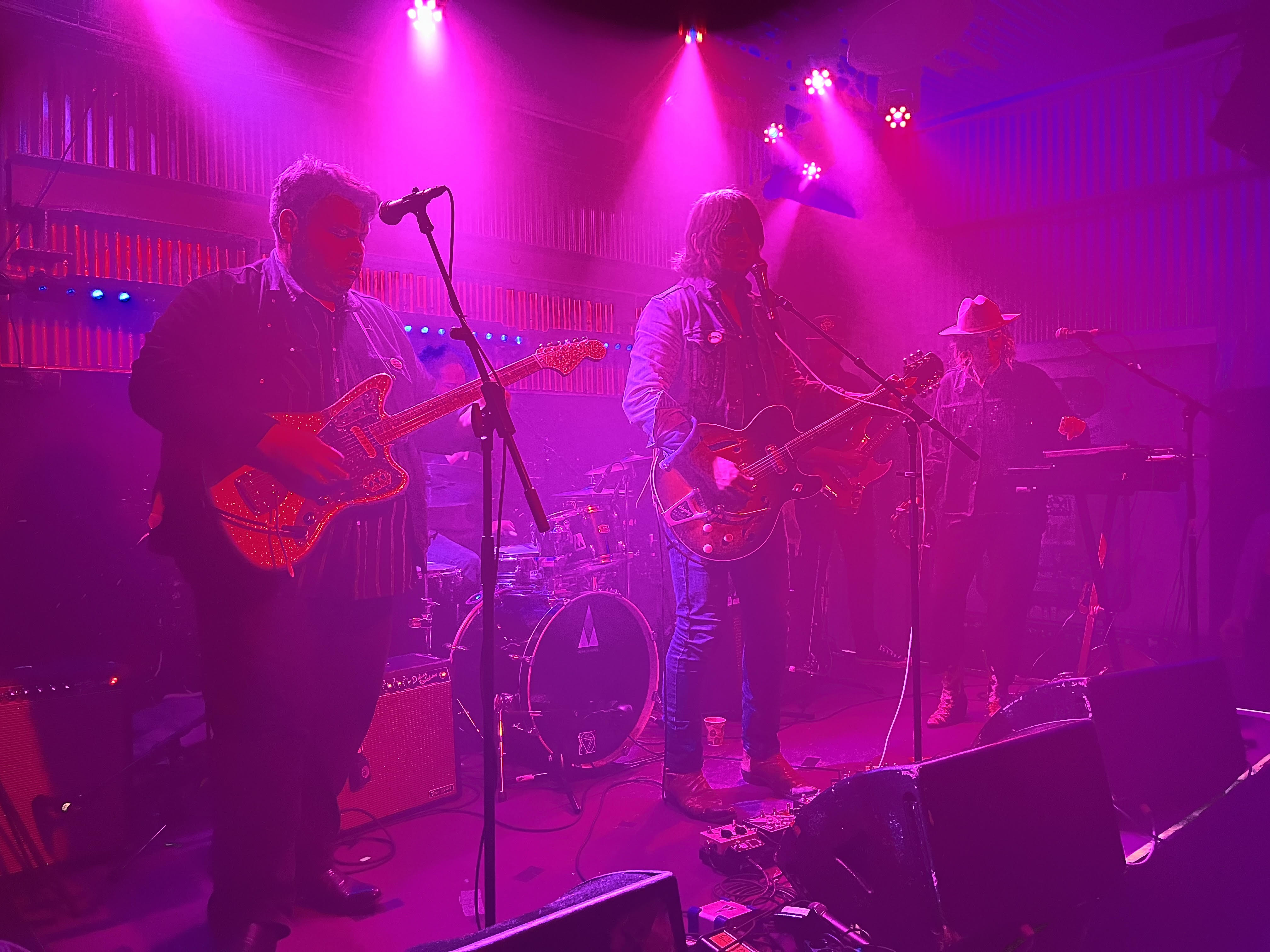 Maybe 100 people have showed up, which is a pretty decent number considering the non-existing marketing activities. I look around me. I can't wrap my head around the audience. They are a mixed bunch. Maybe they are regular visitors to the venue or just music lovers. Federale takes the stage and starts off with confidence. They seem dedicated to put on a good show. The tour is called the Reverb & Seduction tour. The setlist has an emphasis on their latest album. Personally, I prefer the first two albums "La Rayar: A tale of revenge" and "Devil in a Boot" (the two most Ennio Morricone-influenced albums in their catalogue). They play only one song from these albums. On one hand, Federale are on a promotion tour for their latest album. On the other hand, they are in Europe for the first time and could show a wider palette. This night, Federale were more of a rock band with spagetti western influences, than a spagetti western band with rock influences. Luckily, on a few occasions their classic spagetti western influences shines through with guitar loops and high-pitched vocals. This is what I came for. Federale are an accomplished and compatible band with proficient musicians. All wrapped up in amply stage light and smoke machine. Seems like the band also had a good time. All in all, I have nothing to complain about. On the contrary. The $18 ticket was money well spent.
Maybe 100 people have showed up, which is a pretty decent number considering the non-existing marketing activities. I look around me. I can't wrap my head around the audience. They are a mixed bunch. Maybe they are regular visitors to the venue or just music lovers. Federale takes the stage and starts off with confidence. They seem dedicated to put on a good show. The tour is called the Reverb & Seduction tour. The setlist has an emphasis on their latest album. Personally, I prefer the first two albums "La Rayar: A tale of revenge" and "Devil in a Boot" (the two most Ennio Morricone-influenced albums in their catalogue). They play only one song from these albums. On one hand, Federale are on a promotion tour for their latest album. On the other hand, they are in Europe for the first time and could show a wider palette. This night, Federale were more of a rock band with spagetti western influences, than a spagetti western band with rock influences. Luckily, on a few occasions their classic spagetti western influences shines through with guitar loops and high-pitched vocals. This is what I came for. Federale are an accomplished and compatible band with proficient musicians. All wrapped up in amply stage light and smoke machine. Seems like the band also had a good time. All in all, I have nothing to complain about. On the contrary. The $18 ticket was money well spent.
Setlist (as I perceived it)
1. Advice From A Stranger (Reverb & Seduction)
2. Aim for the Heart (No Justice)
3. Heaven Forgive Me (Reverb & Seduction)
4. No Strangers (Reverb & Seduction)
5. The Worst Thing I Ever Did Was Ever Loving You (Reverb & Seduction)
6. Sundown, Sundown (Our Side Of Their Story)
7. All the Colours of the Dark (All The Colours Of The Dark)
8. Hope Don't You Haunt Me (Reverb & Seduction)
9. Shitkicker (All The Colours Of The Dark)
10. The Fire Came Down From The Mountain (All The Colours Of The Dark)
11. Blood Moon (Blood Moon / Mona Lisa)
12. The Blood Flowed Like Wine (The Blood Flowed Like Wine)
13. Talk Is Cheap (No Justice)
14. I Let Love In (Our Side Of Their Story)
15. Almería (All The Colours Of The Dark)
16. Hero (Devil in a Boot)
Encore
17. Taxman Blues (cover)
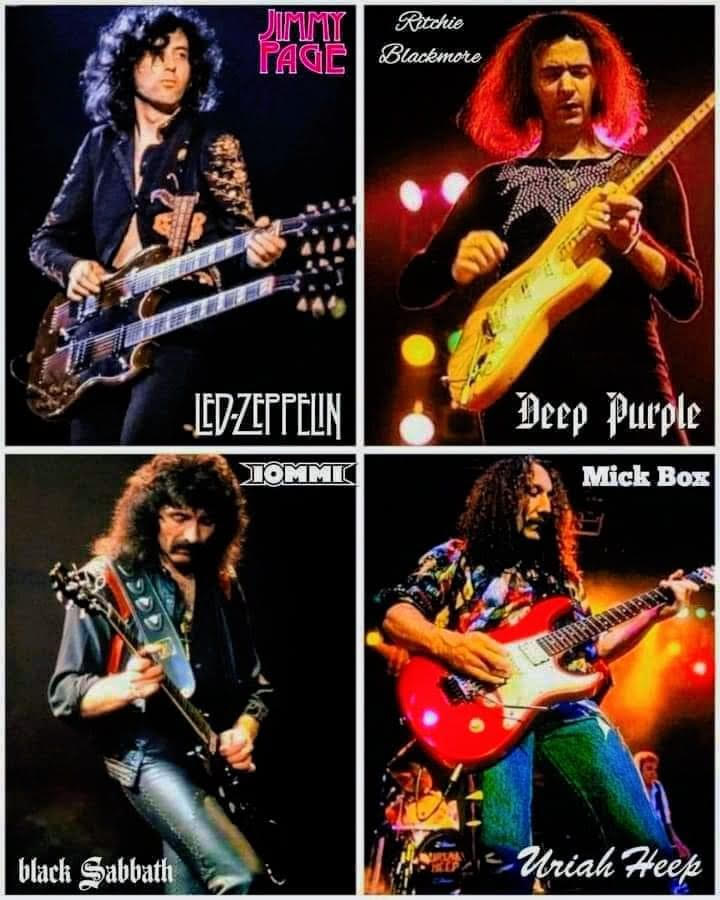 Have you ever played the children’s game "odd one out" (identifying an object that does not match the others)? Look at the picture. Can you spot the odd one out? Ritchie Blackmore is a founding member and the former lead guitarist of Deep Purple. He created guitar riffs. The classic guitar riff on "Smoke On the Water" has inspired many beginners. In 1974 he smashed his guitar on stage before his amp exploded into flames and caught his hair on fire. Ritchie Blackmore is also known for his interest in occultism. In 1984, the British tabloid The Sun featured a two-page spread with the headline "He looks evil, even satanic." Jimmy Page was the guitarist and founder of the rock band Led Zeppelin. He could make fantastic guitar riffs and is notable for occasionally playing his guitar with a cello bow to create a droning sound. The impressing guitar solo on "Stairway to Heaven" stands the test of time. Jimmy Page is also known for his interest in occultism. Allegedly, he has an impressing collection of occult literature. In 1973, Page purchased Boleskine House, a mansion that had once been owned by Aleister Crowley (the wickidest man in the world). Tony Iommi co-founded the heavy metal band Black Sabbath, and was the band's guitarist, leader, primary composer, and sole continuous member for over five decades. He lost the tips of the middle and ring fingers of his right hand in a work-related accident. To compensate, he used prosthetics by melting down a plastic bottle to fingertip-shaped thimbles, and then detuned the strings to make them easier to play. The rest is history. The guitar intro on "War Pigs" is groundbreaking. He is also known for his interest in occultism. The band dabbled in the occult in the early days, but it didn't take. Mick Box is the founder and lead guitarist of rock group Uriah Heep. He is a capable guitarist, but not known for any memorable guitar riffs. I don’t say this out of spite. I mistook a roadie for him in 1975, read more here (opens in a new window). And to be honest, Uriah Heep were never into heavy metal (listen to "Rock 'n' Roll Medley" from Live 1973 if you doubt me). And besides, Mick Box has no track record whatsoever when it comes to occultism. Mick Box is the odd one out.
Have you ever played the children’s game "odd one out" (identifying an object that does not match the others)? Look at the picture. Can you spot the odd one out? Ritchie Blackmore is a founding member and the former lead guitarist of Deep Purple. He created guitar riffs. The classic guitar riff on "Smoke On the Water" has inspired many beginners. In 1974 he smashed his guitar on stage before his amp exploded into flames and caught his hair on fire. Ritchie Blackmore is also known for his interest in occultism. In 1984, the British tabloid The Sun featured a two-page spread with the headline "He looks evil, even satanic." Jimmy Page was the guitarist and founder of the rock band Led Zeppelin. He could make fantastic guitar riffs and is notable for occasionally playing his guitar with a cello bow to create a droning sound. The impressing guitar solo on "Stairway to Heaven" stands the test of time. Jimmy Page is also known for his interest in occultism. Allegedly, he has an impressing collection of occult literature. In 1973, Page purchased Boleskine House, a mansion that had once been owned by Aleister Crowley (the wickidest man in the world). Tony Iommi co-founded the heavy metal band Black Sabbath, and was the band's guitarist, leader, primary composer, and sole continuous member for over five decades. He lost the tips of the middle and ring fingers of his right hand in a work-related accident. To compensate, he used prosthetics by melting down a plastic bottle to fingertip-shaped thimbles, and then detuned the strings to make them easier to play. The rest is history. The guitar intro on "War Pigs" is groundbreaking. He is also known for his interest in occultism. The band dabbled in the occult in the early days, but it didn't take. Mick Box is the founder and lead guitarist of rock group Uriah Heep. He is a capable guitarist, but not known for any memorable guitar riffs. I don’t say this out of spite. I mistook a roadie for him in 1975, read more here (opens in a new window). And to be honest, Uriah Heep were never into heavy metal (listen to "Rock 'n' Roll Medley" from Live 1973 if you doubt me). And besides, Mick Box has no track record whatsoever when it comes to occultism. Mick Box is the odd one out.
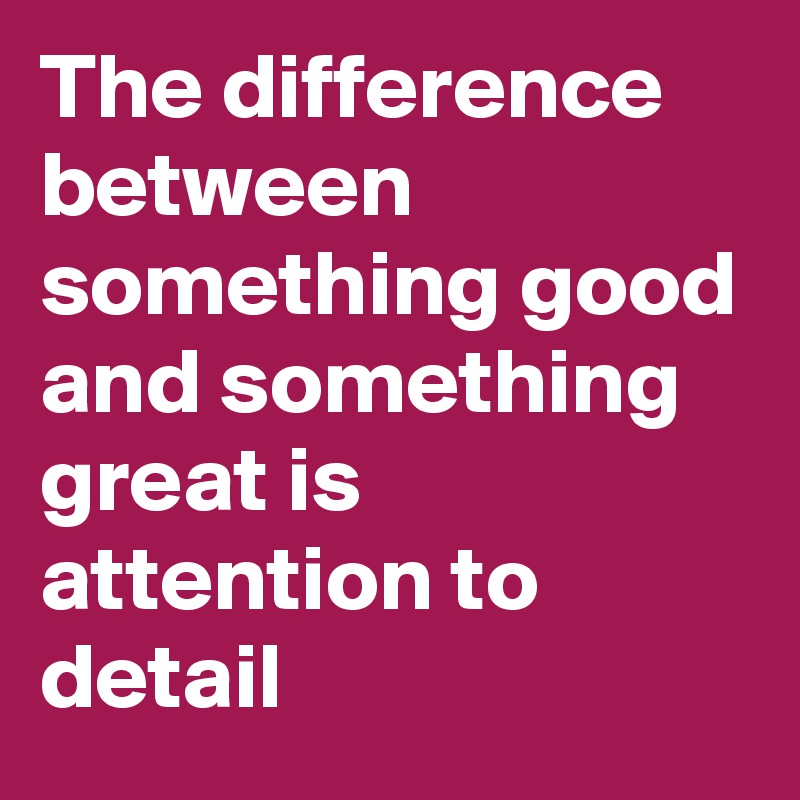 Attention to detail is the ability to observe, analyze, and comprehend every aspect of a given task or situation. It's the dying art of being meticulous, precise, and thorough. I can be attentive. I can spend hours planning and structuring, searching for information, filtering data, fact-checking and cross-referencing, choosing and editing photos for the website. Pixel by pixel, if necessary. Paradoxically, certain things completely eludes me. I'm unable to remember or learn. It doesn't matter how many times i have performed a task. It doesn't stick. Attention to detail requires an interest. That goes for people, places, things, and even relationships. And why bother with things that you don't find interesting. And besides, the human brain cannot absore all information. It would lead to a stack overflow. It's a type of buffer overflow error that occurs when a computer program tries to use more memory space in the call stack than has been allocated to that stack. Too much focus on detail can cause problems. For you and related. Attention to detail is a good thing, taken in moderation. You need to combine attention to detail with an ability to see the big picture and make connections between the two. Where is this blog post going? The difference between something good and something great is attention to detail. There's no "work-around" or "quick-fix" when it comes to running a website. You have to put in the hours or else put it to rest. A job half done isn't done.
Attention to detail is the ability to observe, analyze, and comprehend every aspect of a given task or situation. It's the dying art of being meticulous, precise, and thorough. I can be attentive. I can spend hours planning and structuring, searching for information, filtering data, fact-checking and cross-referencing, choosing and editing photos for the website. Pixel by pixel, if necessary. Paradoxically, certain things completely eludes me. I'm unable to remember or learn. It doesn't matter how many times i have performed a task. It doesn't stick. Attention to detail requires an interest. That goes for people, places, things, and even relationships. And why bother with things that you don't find interesting. And besides, the human brain cannot absore all information. It would lead to a stack overflow. It's a type of buffer overflow error that occurs when a computer program tries to use more memory space in the call stack than has been allocated to that stack. Too much focus on detail can cause problems. For you and related. Attention to detail is a good thing, taken in moderation. You need to combine attention to detail with an ability to see the big picture and make connections between the two. Where is this blog post going? The difference between something good and something great is attention to detail. There's no "work-around" or "quick-fix" when it comes to running a website. You have to put in the hours or else put it to rest. A job half done isn't done.
